One of my first articles for The Fandomentals described my love for Type A Hot Messes. Characters who strive to control their lives, and sometimes put up a very good front of it, but who are not so secretly a hot, hot mess. There is hardly a better example of a Type A Hot Mess than Blair Waldorf.
Blair was a main character in Gossip Girl, a CW teen drama that was initially acclaimed and has come to be generally mocked for its atrocious ending and final reveal. The premise of Gossip Girl (GG) is a “big concept” kind of pitch. There is an anonymous Internet persona who is dedicated to outing the dirty secrets of Manhattan’s elite. Blair is one of those elite. The show was based on the book series by Cecily von Ziegesar, who based the story on her own experiences in an all-girls boarding school in Manhattan’s Upper East Side.
It has been twelve years since the show premiered in 2007 and nearly seven since it ended in 2012. It set the precedent for teen dramas such as Pretty Little Liars, Riverdale, and Netflix’s Elite. Almost seven years, and I haven’t been able to stop mulling about it.
Specifically, the ending the show gave to Blair. After a show spirals into bad, if one sticks to it, usually it will be because of the characters the viewer cares about. I kept on watching GG even when it did little more than infuriate or bore me because I was emotionally attached to Blair Waldorf.
Blair started out the show framed as the single most despicable girl out of the bunch. She was ruthless, cruel and underhanded. She is also established quickly as deeply insecure, especially regarding her best friend and on-and-off rival, Serena van der Woodsen. She was strongly attached to her plans, which she saw in a hazy, picture-perfect frame. Throughout the series, Blair went on a journey of breaking down her prejudice and becoming more self-assured. She learned to make new plans. Perhaps most notably, Blair became entrenched in an abusive cycle, and she tried to break free.
Blair was perhaps the character that most changed and grew out of all the main cast… Only for it to be undone at the last minute.
Blair had taken three steps forward and she took four back at the end of the fifth season of the show. Not only that, but her devolution was done for the benefit of her abuser, and indirectly, the de-facto “It Girl”. In one fell swoop, poof! Everything Blair’s arc had been working towards since season three and particularly in season five, gone.
I have spent seven years ranting about this, fam.
The Obsessive Analysis of Blair Waldorf
It is one of those things where you’ll be happily scrolling through Twitter or mopping the floor or eating a sandwich, and you remember that thing that really bugged you once a long time ago and darn it! Now your meal is ruined because you’ll have to think about that again. Rant internally or find a victim to rant to, are the only two choices. Thinking about Gossip Girl, and by extension Blair, is like that for me.
All my rants and analysis of Blair’s story has been Doylist. In fact, most of the analysis of Gossip Girl you can find online is that way. It is the shorthand because the outside hand is so clear to see, as the logic on the show got more and more broken as it went on. The 180 Blair did in the last three episodes of GG’s season five was so violent that it’s hard to see it as internal. It suggests more about the way creators Stephanie Savage and Josh Schwartz saw their characters, as well as a stubborn commitment to a planned ending despite the natural evolution of characters.
Dan and Serena were endgame, as were Chuck and Blair for some time now. That was the plan. Even though Blair had finally told Chuck off apparently for good. Dan had had enough of Serena’s games and was in love with Blair. But they kept a death grip on the endgame, and so they bent plots and the characters like pretzels to make it happen.
This is the reading I have always favored, a little bit in denial about what happened. It is for the reasons I’ve mentioned, but it has also allowed me to retain some of my sixteen-year-old self’s romanticizing of Blair’s character. The writing was out of character, that was not Blair. It helps that there are other things that defy all logic—there is no way that Dan Humphrey was Gossip Girl all along.
In the back of my brain, though, I have always known that there is a plausible Watsonian explanation for Blair’s swerve at the end of season five. So now, for the first time, I will entertain this analysis. One thing I will not do, though, is watch the final season of Gossip Girl. I refuse to do that to myself.
The Obsessive Watsonian Analysis of Blair Waldorf
Who even is Blair Waldorf?
She is the daughter of acclaimed fashion designer Eleanor Waldorf, whose husband left her for another man. She is the wearer of the Queen Bee crown at school, where everyone admires and fears her. She is an A+ student. She is the girlfriend of high-pedigree dumb boy Nate, who is in turn in love with her best friend. She is the best friend of hottest-girl-in-town Serena van der Woodsen, who can claim Blair’s crown whenever she wants it.
But who is Blair under all of that, and without all those people? Hell if she knows.
Blair is defined by them, and her status with them. Her family and friends represent a microcosm of the society she lives in, where image, power and wealth are everything. She needs to be perfect and garner admiration, lest she becomes irrelevant and forgotten.
One of the most crucial aspects of Blair’s character is her relationship with her best friend. Blair is smart, but she’s a bit stiff with people. Her insecurity gets the best of her in her relationships, and often resorts to underhanded tactics to get what she wants. Meanwhile, Serena is a social butterfly. She doesn’t try half as hard at school or with people, and yet she still triumphs in all the things Blair struggles to. She’s capable of charming the pants off everyone and getting exactly what she wants, whenever she wants it. That is what she’s used to, so she doesn’t think twice, even to consider how it might hurt other people, not even her best friend, Blair.
It is hard for Blair to feel like she shines when standing next to someone like Serena. No matter how hard she tries, she can’t outshine her. Of course, part of the problem is that she tries so hard, while Serena seems effortless and ethereal. Anyone who has ever felt Second Best could relate to Blair’s struggles.
She struggles to separate her identity from her mother and her success (and her divorce), from Serena, under whose shadow she lives, and from the men in her life. Another issue for Blair is the constant need for status and validation, which really stems from the latter.
We’ll look at Blair’s evolution through the lens of her relationship to other people and her society’s expectation of her, a well as her expectations for herself.
Mommy Issues
Blair’s mother, as presented in the first season and previously, especially, plays an important part in who Blair is, particularly her issues with self-image.
This is first showcased in the fourth episode of the show, “Bad News Blair”, where Eleanor asks Blair to be the face of her new line. Blair preens at her mother’s attention. But when Eleanor discovers that Serena looks better in the photos, she opts to trade them without telling her daughter it was Serena she was changed for. Blair confronts her mother emotionally for the first time here.
“You could have picked a stranger; you didn’t have to choose my best friend.”
Seeing Eleanor try to guilt and manipulate Blair into forgiving her and helping her, it’s easy to see where Blair has learned to navigate the world. “If my company had lost this deal because of you, I’d never forgive myself”, Eleanor says, evenly and with meaningful looks towards her daughter. She is clearly placing the moral and emotional responsibility on Blair, instead of assuming her part in it. At this point, Blair sees that her mother is to blame for what happened and not Serena—with the help of Dan Humphrey, the outsider—so for the first time she stands up for herself, and replies, “I hope you never do.” This marks the beginning of the fracture in Blair and Eleanor’s status quo, after which all that is left is building back up.
Eleanor is a working mother who put her career before her daughter. Growing up, Blair was Daddy’s Little Girl, as is revealed in season 1’s Thanksgiving episode, “Blair Waldorf Must Pie”. Harold, Blair’s father, ended up leaving the family for another man. This affected Blair deeply, as it felt like Harold was leaving her and perhaps even thought he saw her as a mistake.
Eleanor was of course affected by this as well, and her reaction was to throw herself deeper into her work and pay her daughter less and less attention. She’s the kind of mother who reminds Blair of her posture and warns when she’s gaining weight. Almost like she saw Blair like a doll to be prettied up instead of a real person.
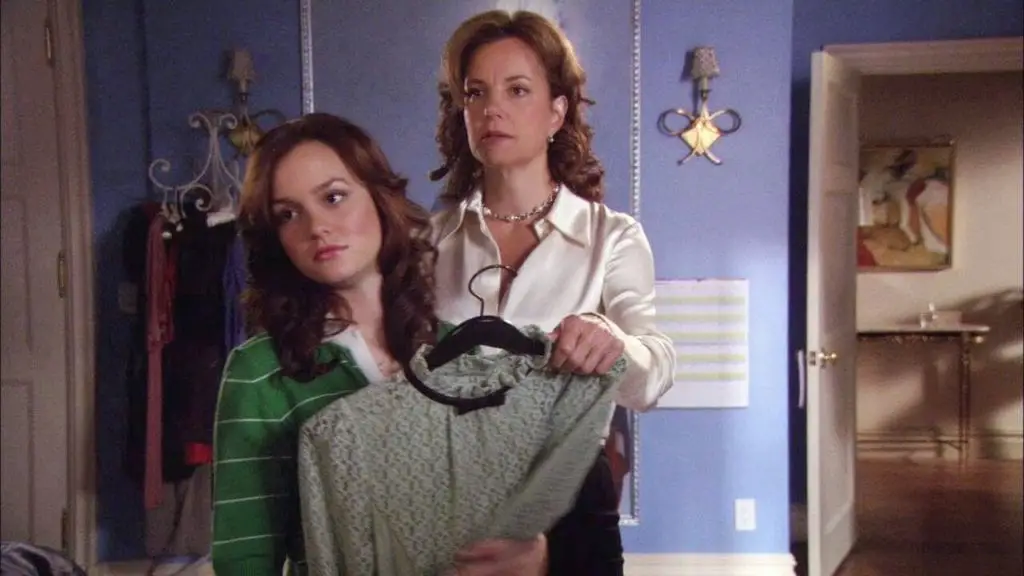
As a fashion designer, she works with models, and it’s safe to say Blair has been around them all her life, constantly comparing herself to them. In the same Thanksgiving episode, it is revealed that Blair suffers from an eating disorder. When her father left, she had recently come off a crisis, and she relapses when he comes back to visit.
The connections are easy to make. She feels like her father doesn’t love her, and she feels like she’s not good enough, not pretty or skinny enough for her mother. Parental approval is something she lacks from her mother, and parental love she feels like she lost when her father left.
Her relationship with her father stabilizes pretty quickly after he reassures her he still loves her, though it takes a bit more work with Eleanor. Eventually, she gets there. It’s clear Eleanor herself had some trouble with her own self-image and expectations, which she learns to let go of. Her relationship with Cyrus—a bald, dorky little guy with good intentions—serves to demonstrate she has stopped valuing image as much and is instead in search of deeper, truer connections. She eventually manages one with her daughter as well.
Queen B
Blair’s role as Queen Bee in Constance Billiard, the exclusive private school she attends, starts out as key to Blair’s persona and conception of herself.
In the opening of the show, she has taken over the role in the absence of Serena, who left out of the blue a year previous. Blair rules with an iron fist. She takes pleasure in scaring and torturing her “minions”, as she calls them. Being in her circle is a sign of status, and it is not something Blair hands out easily, as is exemplified by her treatment of Jenny “Little J” Humphrey, who is dying to be in her orbit. Blair pushes her to dangerous limits, and one can assume she once had to jump through hoops as narrow and perhaps even barbed.
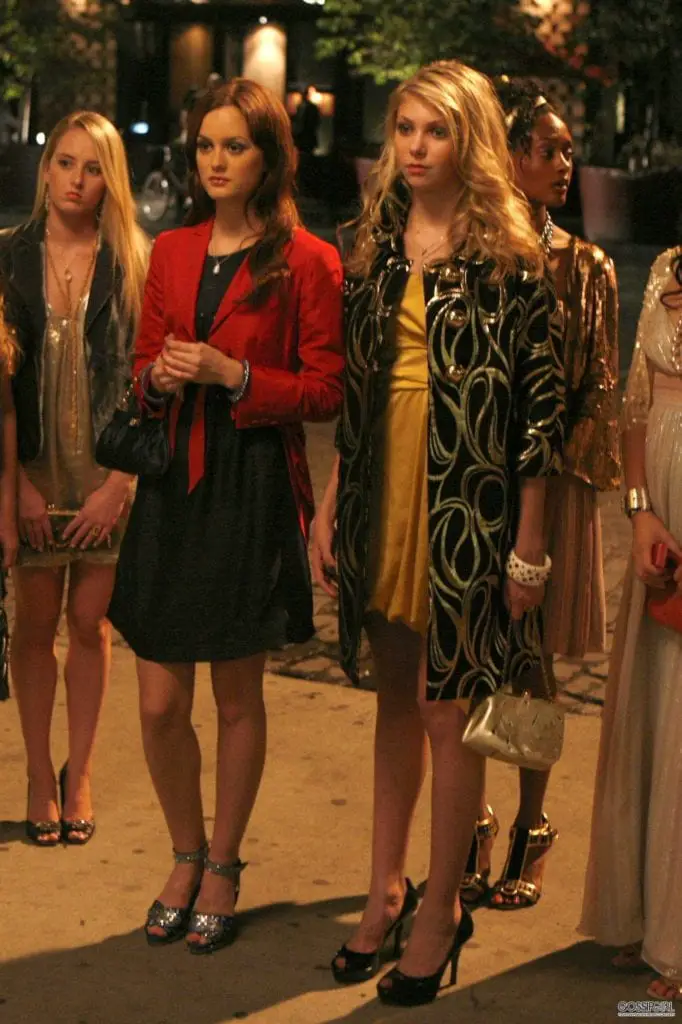
Her lack of generosity and underhanded techniques to wield and keep power leads to Jenny taking her down at one point. But Jenny’s hold on it is flimsy. Queen Bee of Constance is a role that takes ruthlessness and power, but it also takes money. Blair has it, Jenny doesn’t.
Blair starts out incredibly classist. She was always going to have the upper hand at Constance because she is part of that world, while the newbie from Brooklyn isn’t. Everyone else around them knows that. She uses her tactics to take Jenny down with gusto. Their rivalry continues throughout the show until Jenny’s (really Taylor Momsen’s) departure.
Now, when Serena takes back the crown from Blair… that’s a different story.
It is easy for Serena to do it—she could have at any point she wanted to. She’s simply more popular, and when she feels like it, more cunning and deadly than Blair. Because unlike Blair, Serena can screw people over with a smile on her face and come off as the good guy. The worst part is it doesn’t even mean that much to her.
Serena and Blair mend their differences over the queendom of Constance. Blair ends up as Prom Queen, and Serena recognizes all that means much more to Blair than to her. But that power Serena has is always in her pocket, and the sensation remains that she can wield it at any moment.
The Eternal Competition
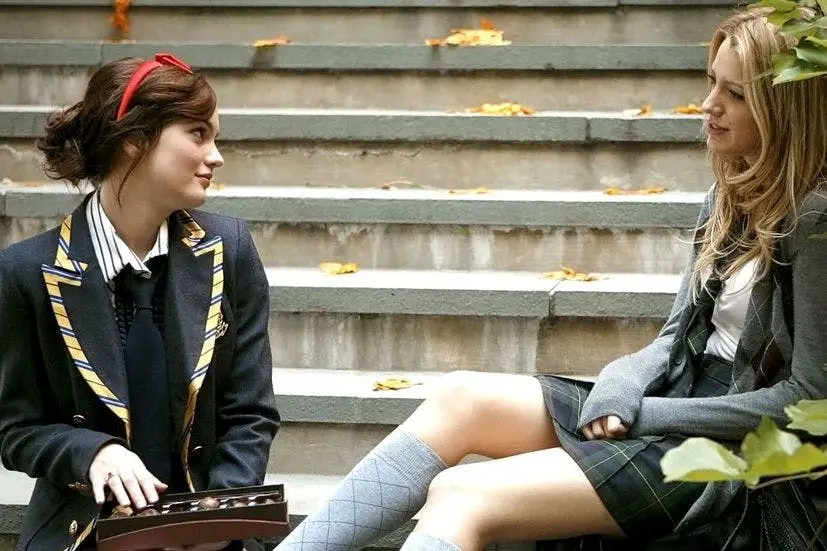
Now is a good time to take a detour and talk about a society that pits women against each other constantly. That’s our society. Blair and Serena grew up (presumably) in this society, where the mindset is: other women are our competition. More for another woman is less for me. Both of them buy into this, even if both would probably deny it.
The difference between them is that Serena fits more comfortably into the standards society sets for the ideal woman. She may rebel sometimes, like dating Dan Humphrey or running away from it all, but she knows that ultimately, she can take all of it back whenever she wants. She could come back to Constance and instantly be the “It Girl” again. She can date Nate or any other pedigreed billionaire she wants to.
Blair may seem like she fits in, but that is only because she works very hard to do it. She’s too headstrong, too stiff, perhaps even too intellectual. She’s bossy and not very tactful to speak. She may pretend she wants the life of an heiress, but her true self yearns for her own success and recognition, apart from her social status.
Blair and Serena enter into competition over a man only twice during the course of the show. Once with Nate, where Serena is an unwilling participant. Later, with Dan, in which Blair is more of an unwilling participant in her denial. But we’ll come back to that.
NYU to Blair Waldorf
Blair is a Type A personality. She has mapped out her life from a young age. She was going to date Nate Archibald, get into Yale, excel at it, and then she would marry Nate, have his babies and perhaps become a strong career woman like her mother.
The first thing that flew out the window was Nate. The second and perhaps the hardest hit was losing Yale.
Blair’s scheming constantly blew up in her face, but the first time the consequences were bigger than she could control was season two. She had a conflict with a teacher and used scheming and lies to try to get rid of her. While she was able to succeed in her scheme with the teacher, her victory ended up costing her place at Yale. At the end of high school, the perfect picture of her life had shattered.
She was left with only one option for college: NYU. Dan Humphrey was going there, and they were both beneath her, in her opinion. Worse, she didn’t fit in at all and needed Dan’s help to get through it. NYU was an “Earth to Blair” moment. It was a shock to her that the small bubble she lived in did not represent the wider world, and her standards wouldn’t save her everywhere. She learned to compromise, to change her plans, and to put in hard work instead of schemes, at least in academic endeavors. Though she ended up transferring to Columbia, the lessons stuck with her, and through the end of the show, she didn’t involve underhandedness or plotting where school was concerned.
She doesn’t stop being Blair, though, and her behavior and self-worth also evolve with the depiction of her romantic relationships.
Blair and the Boys
Blair has four big romantic relationships that last more than a couple of episodes. They are, more or less in order, with Nate Archibald, Chuck Bass, Prince Louis of Monaco, and Dan Humphrey. Each relationship brings out something different from Blair’s personality. Nate and the Prince align with the way she starts out seeing herself and her plans, while Chuck and Dan, initially at least, clash with it, violently.
Nate, the Pedigree
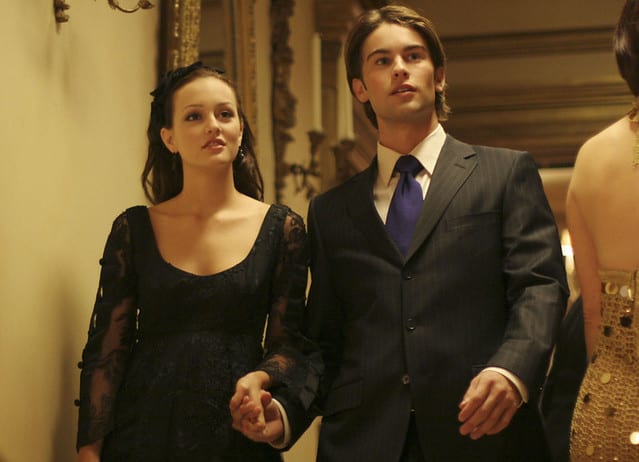
Nate Archibald is a plain slice of white bread. He’s not a terrible person, but he’s also not terribly interesting. He certainly thinks he is more righteous and unselfish than he is. Nate is aimless and suffers from “this life is meaningless” angst throughout the story. He does, however, have the biggest pedigree of all his friends. He is old money and sophistication. Attention from him—at least in Blair’s eyes at first—equals instant status. Blair wants this.
Nate, on his part, wants Serena for a considerable portion of the show. Serena doesn’t much care, and frankly doesn’t even notice. Yet she can take Nate away with a snap of her fingers. Which of course, kills Blair. She engages in a competition for Nate’s love and attention. The battle, however, is lost since it starts, and Serena’s not even playing.
Her break-up with Nate leads her straight into the arms of Chuck Bass.
Chuck, the dangerous choice
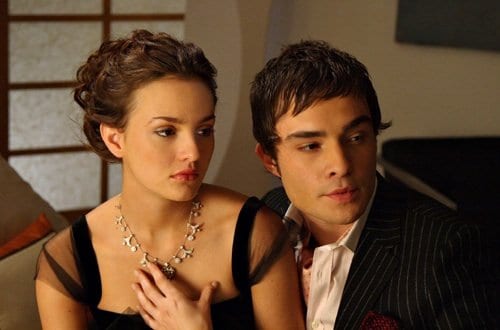
Before I go on, I must make something very clear: this analysis is not kind to Chuck Bass. I know there are many out there who view him as a victim only and will defend him. I myself would have before season three of GG. I recognize he was a victim, but he was also a victimizer, an abuser, and he never had a real redemption arc where he repented (not regret, repent!) for his actions. If you do not want to hear any of that, stop reading now.
Blair’s relationship to Chuck is arguably the second most relevant one in Blair’s entire arc. It bleeds into nearly every other connection she makes after and is ultimately, the prime cause of “the Tragedy”.
Blair sleeps with him on a whim after her break-up with Nate, which she soon regrets. Chuck is smarmy and disagreeable, and Blair and Serena started out tolerating him because he was Nate’s best friend.
Chuck is not someone she should like, not according to her worldview. Chuck’s father, Bart Bass, is a self-made man, so Chuck doesn’t have the status that, say, Nate has. He is clearly psychologically abused by his father, who sees him as a disappointment unworthy of him. That does not in any way excuse Chuck’s behavior, which is appalling from the get-go—he drinks, he fools around with women, whom he views as objects, and his business ideas are all about debauchery and excess. Not to mention (and this is constantly forgotten) that he tried to rape Jenny Humphrey, and later his so-called friend Serena on the very first episode.
He is not the cookie-cutter gentleman of high society Blair wants. And yet she can’t stop sleeping with him. That is, until Nate comes calling at her door. That only lasts as long as Nate doesn’t know she and Chuck had been involved.
Blair and Chuck’s relationship… it wasn’t good from the start. Chuck told her he had feelings for her and she laughed it off. Then Blair realized she really wanted him, and he rejected her, encouraged by his father. Blair then made him jealous with a fancy English boyfriend. Chuck sabotaged her relationship instead of talking to Blair honestly. Then he tried to force an “I love you” out of her when she wasn’t ready, while also withholding from saying it himself. It was a push and pull of emotionally manipulating and hurting each other from the get-go.
When Chuck’s father dies, it seals Blair’s fate regarding him. He is a mess after that, going as far as to threaten his own life. The only person he lets in, eventually, is Blair. It is a defining moment in Blair’s story. Here is a man who is broken and hurt, who needs her and wants her more than anyone else.
Remember: Blair has very low self-worth. Him needing her more than anything is like crack to her. Finally! Someone who doesn’t prefer Serena, who appreciates her “dark” side. That is dangerous in and of itself. Now consider Chuck. Someone who resorts to cruelty the second he feels vulnerable. Who one minute tells her he has feelings for her, and then tells her she’s “like one of the Arabians my father used to own, rode hard and put away wet.”
When they’re together, Chuck brings out the worst in her. The part of Blair who prefers to scheme and lie rather than communicate. The part that is classist and elitist. He absolutely does not help with Blair’s feelings of worthlessness and her insecurities about being loved, constantly centering importance on himself.
“So the next time you forget you’re Blair Waldorf, remember I’m Chuck Bass and I love you.” (3×04)
You’re important because I love you. I define you. That’s what that quote, endlessly romanticized, is really saying. Chuck and Blair’s relationship is toxic from the get-go. He is emotionally abusive from the get-go.
It comes to a breaking point when Chuck, fearing he’d lose his hotel, trades Blair’s body for it. It is not only as bad as it sounds, but worse. Because he doesn’t ask, and he doesn’t force her. No. He emotionally manipulates Blair into going there herself, conspiring with Jack about how to go about it. Jack doesn’t sleep with her. Instead, he tells her the truth.
Chuck: “[…] nothing happened, this was all for nothing!”
Blair: “It’s not nothing. I didn’t do it but I would have”.
Blair: “I want […] real love. Pure and simple love”
Chuck: “You’d be bored within five minutes”
Blair: “Better bored than ashamed of myself. I would do anything for you, Chuck. But what if that’s wrong? I never thought it was possible to love someone too much, but maybe it is. I don’t like who I’ve become with you.”
Resisting the impulse of commenting on the Doylist implications of this dialogue, from a Watsonian perspective… this should have been it! Chuck sold her for a hotel. He manipulated her into it and then acted as if it was a test of her character. She realized this, finally, and got some clarity about their relationship. While some may latch on to her confession of overflowing love, I find it’s the final line that’s most important: she doesn’t like herself when she’s with him.
But of course, this wasn’t the end for Chuck and Blair. Not five episodes later, she was choosing him again. After Chuck gave her an ultimatum, no less. “Meet me here at this time or you’ll lose me forever”. He made Blair the one to run, to beg. He put all the responsibility of them breaking up on her. After he S O L D H E R F O R A H O T E L.
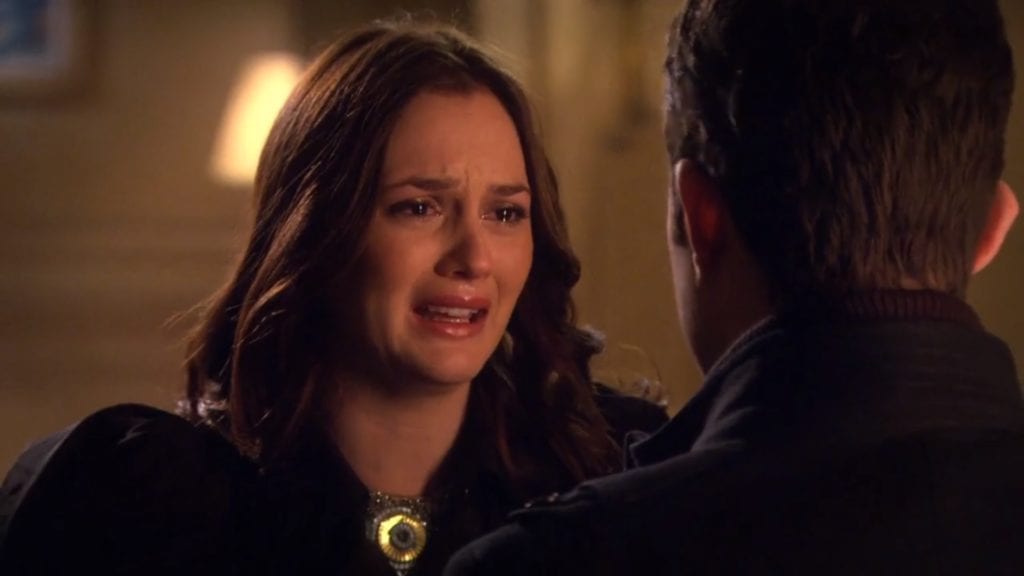
The cycle of abuse is named that way because it is cyclical. The abuser has an outburst, and then they’ll apologize and become perfect again. The victim will forgive and think that perhaps they were making it too much of a big deal, or maybe it really was their fault. Then it starts all over again. Chuck doesn’t take “no” for an answer and insists on winning Blair back. He grand-gestures Blair to death in ways he knew she is weak for—he was, for example, the one who put in the papers for Blair to transfer to Columbia.
It may be tempting to see that as romantic, but the way Chuck keeps doing things that affect Blair’s life without asking her opinion… that’s called control, and it is not romantic or healthy. This will not be the last time Chuck interferes in Blair’s life without her consent.
Despite the ultimatum, Blair took him back, but later found out he had slept with someone else the second he thought she’d rejected him. Okay, good for you, girl. That’s it, right? You’ll never go back to him again, right?
Wrong.
Life After Chuck Before Chuck
Who even is Blair Waldorf?
She is the girl Chuck Bass loves… who’s not with him anymore.
Blair defines herself through the people around her. It is what determines her status—the heiress, the queen, the girlfriend of… Being with Chuck only encouraged this view of herself. So, who is she without him?
Hell if she knows.
Seasons four and five are in large part about her trying to define herself sans Chuck. She is single for a significant portion of both seasons, and despite being unable to break him out of her life, she does seem to find some meaning beyond who she’s with, and a purpose all her own. Yet in the end, she forgoes all that for Chuck, again. How come?
I will discuss those next month, in The Tragedy of Blair Waldorf, Part 2. That’s right. This has become a two-parter. I accidentally wrote over eight thousand words on this…
In my defense, I did warn that this was an obsessive analysis of Blair. In Part 2 I will also discuss her last two relevant relationships, with Louis and Dan, and delve deeper into her relationship with Serena.

